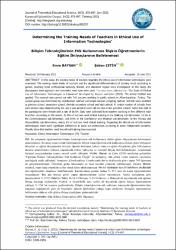Determining the training needs of teachers in ethical use of information technologies
Citation
Baysan, E. & Çetin, Ş. (2021). Determining the Training Needs of Teachers in Ethical Use of Information Technologies . Journal of Theoretical Educational Science , 14 (3) , 476-497 . DOI: 10.30831/akukeg.885891Abstract
In this study, the training needs of teachers regarding the ethical use of information technologies were examined. The training needs levels of teachers and the significant differentiations of training needs according to gender, teaching level, professional seniority, branch, and education levels were investigated. In this study, the discrepancy view approach and normative need type were used. The data were collected via “the Scale of Ethical Use of Information Technologies in Education” developed by Baysan and Çetin (2019). The survey method was applied. The research was carried out with 745 teachers working in public schools in the city center of Afyonkarahisar, Turkey. The sample group was determined by stratification method and simple random sampling method. Schools were stratified as primary school, secondary school, divinity secondary school and high school. A certain number of schools from each stratum were determined by lot, and it was aimed to reach all teachers in the specified schools. More than half of the participants were female with a rate of 55.5%. Data were collected from teachers working in five different main branches. According to the results, 22.8% of teachers need ethical training in the Stalking sub-dimension, 14.5% in the Communication sub-dimension, and 9.4% in the Confidence and Material sub-dimension. In Privacy and Accessibility sub-dimensions, nearly 1% of teachers need ethical training. Regarding the ethical use of information technologies, there were significant differences in some sub-dimensions according to some independent variables. Results show that teachers need less ethical training than expected. Bu çalışmada öğretmenlerin bilişim teknolojilerinin etik kullanımına ilişkin eğitim ihtiyaçlarının belirlenmesi
amaçlanmıştır. Bu amaç çerçevesinde öğretmenlerin bilişim teknolojilerinin etik kullanımına ilişkin eğitim ihtiyaçları
düzeyleri ve eğitim ihtiyaçlarının cinsiyet, öğretim kademesi, kıdem, branş ve eğitim düzeylerine göre farklılaşması
durumu araştırılmıştır. Çalışma kapsamında farklar yaklaşımı ve normatif ihtiyaç türü kullanılmıştır. Araştırmada
betimsel araştırmalardan tarama modeli tercih edilmiştir. Veriler, Baysan ve Çetin (2019) tarafından geliştirilen
“Eğitimde Bilişim Teknolojilerinin Etik Kullanımı Ölçeği” ile toplanmış, elde edilen veriler istatistik yazılımları
aracılığıyla analiz edilmiştir. Araştırma Afyonkarahisar il merkezinde devlet okullarında görev yapan 745 öğretmen
ile gerçekleştirilmiştir. Örneklem grubu tabakalama ve basit tesadüfi yöntemle belirlenmiştir. Okullar ilkokul,
ortaokul, imam hatip ortaokulu ve lise olmak üzere tabakalanmıştır. Her bir tabakadan kura ile belirlenen okullardaki
tüm öğretmenlere ulaşılması hedeflenmiştir. Katılımcıların yarıdan fazlası % 55.5 oran ile kadın öğretmenlerden
oluşmaktadır. Beş ana branşta görev yapan öğretmenlerden veriler toplanmıştır. Analiz sonuçlarına göre
öğretmenlerin % 22.8’i Habersiz Takip, % 14.5’i İletişim, % 9.4’ü Güven ve Materyal alt boyutlarında etik eğitime
ihtiyaç duyduğu söylenebilir. Gizlilik ve Erişebilirlik ismi verilen alt boyutlarda eğitim ihtiyacı öğretmenlerin
yaklaşık % 1’lik bir kısmına gerekmektedir. Bilişim teknolojilerinin etik kullanımı konusunda öğretmenlerin bazı
bağımsız değişkenlere göre alt boyutlarda anlamlı farklılıkları olduğu tespit edilmiştir. Sonuçlar, öğretmenlerin
beklenenden daha az etik eğitime ihtiyaç duyduğunu göstermektedir.



















